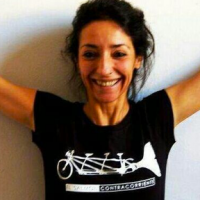After the Initial Public Offering Uber had in May, all the expectations around its value evaporated. Despite this, the figures of the investments in the company are still astronomical. In whose hands are the companies of the called collaborative economy?
Silvia Díaz Molina is an anthropologist specialized in Gender Studies and a social researcher seeking to ground her work in more humane and sustainable organisations. She has experience in development cooperation and has been involved in different NGO projects giving awareness-raising workshops.
Elena Martínez Vicente is a product designer, specialized in designing better processes and more understandable products for humans. She was a designer with the P2PValue project and has extensive experience collaborating with commons, communities and P2P projects, including an ongoing collaboration with the P2P Foundation on our publications and the Commons Transition Primer.
Silvia and Elena are team members in P2P Models, a research project examining the infrastructure, governance and economy of decentralized, democratic organizations, with a particular focus on value allocation and distribution.
We asked them to tell us about their experiences working in the commons, in academia, and in the broader world.
Elena, Silvia, tell us a bit about your backgrounds, interests and how you came to be involved in the P2P Models project.
Elena: Since 2006, I have worked as an Interaction Designer in the private sector, also working for NGOs and cooperation projects in general, whenever I had a chance. From my days as a student, and intermittently, I have been in and out of activist groups, feminist and commons communities. It is not until 2016 that I could finally dedicate my entire time at work to “designing for the good ones”. Since then, I have been trying to translate difficult concepts for the common(s) people through infographics, post, illustrations and simple designs. I also try to bring some sanity to free software, since often in large projects, very good intentions are left on the wayside because it is “a pain in the ass” to use them as these projects do not give the right importance to design and user experience.
Silvia: Really, I was never in touch with these themes before, in fact, I think I always avoided using technology in general (I’m now more concerned about how important and powerful this kind of knowledge is). I was always very confused about what to study. I have a lot of diverse interests: dancing, carpentry, philosophy…and although now I find it positive, at that time I felt pressure to “find my speciality”. What I knew, was I liked to write and I was interested in social issues and this led me to Anthropology. Partly because of diverse life experiences, years later I started a master’s degree in Gender Studies and Development Cooperation in Madrid, which offered an internship in Colombia. This experience reinforced my liking for research. When I was back in Madrid, a friend told me about this job opportunity and I did not hesitate to try it.
“
We strongly believe that the decentralization of power is possible beyond the technical part
Can you describe what P2P Models is about? Who else is on the team, and what stage is the project in right now?
Silvia: I am still understanding what this project is about…hahaha. I’m lucky enough to have some master classes with Samer, our principal investigator, to know more about the tech part. I have a much clearer image about the social side of the project. We want to better understand how the governance and the distribution of value work happens in the CBPP (Commons Based Peer Production Communities), in order to know how blockchain could be useful for them. Fortunately, we have a sociologist-computer scientist in our team, David Rozas, who can be the link between the social and the tech part. We are 7 people in total, with different backgrounds and education but with activism in common. Also, we have a lot of collaborators and advisors who help us. We are at the beginning of the project, still taking off, maybe in the most challenging stage or where we should take more important decisions.
Elena: P2PModels is a research project full of difficult tech concepts so it is a beautiful challenge for me. Basically, we can summarize it in a question: Could we advance to a Commons Transition with blockchain?
The project has three main branches to build decentralized, democratic and distributed organizations. We intend to collaborate with international communities to learn from them and to think about technologies that could help to improve the lives of the people who work in these communities.
The people involved are Samer Hassan, principal investigator, David Rozas and Silvia in the sociological part right now, Sem and Antonio as tech advisors and Genoveva, our word-translator for humans.
What are some of the projects being studied?
Elena: Right now, we are centered in designing better processes within the team, building the basis as a group and rethinking our team culture. A very important (and invisible) task. In terms of productive work, we almost have the pilot communities, for the ethnographic research. Secondly we are working on the brand, the new website and the communication strategy. We are just a few people doing a lot of stuff!
Silvia: That is one of the important decisions we should take and we are still thinking about it. We have drawn up the criteria to choose which projects could be interesting to study, and it seems like in the next months we can start some provisional social research but as I said, this is also under construction! We are full of verve, and we want to take on a lot of case studies but we have to be aware of our capabilities, in terms of time etcetera.
Blockchain-enabled projects are meant to be about decentralizing power, but treat this in a technical way. How do you see this project addressing other issues about decentralizing power, taking into account gender, race, class…?
Silvia: Thank you for asking this question. We strongly believe that the decentralization of power is possible beyond the technical part. Because of that we are giving the same value to both the tech and social sides of the project. Personally, I’m really focussed on bringing a gender perspective to the project, of course an intersectional one. We are going to put all our efforts into this in order to carry out gender-mainstreaming in the project, starting first within our team and our own culture. We believe strongly that “the personal technical is political”.
Elena: Decentralizing power is the foundation, in your own dynamics and in your relationships as a working group. And it is true, I can see a lot of people talking and talking about decentralizing power in both blockchain and the commons. What they do not ask about is their own race, class or gender privileges of being there, maybe they have some people behind doing the invisible work? Are their personal relationships unequal? Great speeches, theories and papers are useless without considering this.
Communities involved in contributory accounting have different concepts of value and value tracking. Can we avoid the mindset that says that the only value worth tracking is exchange value?
Elena: We have to try it!! It is a partial way, inherited from capitalism and therefore a patriarchal way to see value. People contribute in different ways to the group. What about emotional value? I always work better with people who take care of me and who I love. I do not know if this type of value can be tracked, but we all know that it is there, we cannot ignore it and try to measure and track all the facts.
Silvia: Yes, I think we can. Feminist economy has been doing this, challenging the heterodox economy, for many years. It is a matter of having the will and developing a broader outlook. It is not easy, I have never worked before in tech and I am still struggling with how to apply my knowledge in this field. I assume it is going to be a very creative process.
“
Affective and invisible work is the base of all groups and society
What about invisible or affective work? Can these be tracked and measured?
Elena: Affective and invisible work is the base of all groups and society. I am not interested in measuring them, but maybe we could try to train in empathy, listening and learning a little more. In Spain, for example, assemblies, work meetings… are often held at 8 p.m. This is absolutely incompatible with the caring done outside of work, and nobody seems to mind. This makes people that have to care disappear from decision making and groups. In my opinion, it is a capitalist heritage that we need to rethink.
Silvia: I don’t know if it is a matter of measuring. The feminists working in development cooperation, for example, have done a really good job with time, using surveys or calculating the contributions of domestic and affective work to the GDP. On the other hand, I think a very important first step is to consolidate the idea of invisible and affective work as the base of life, and understanding how without it, there is nothing else. This kind of work must not be in the periphery, waiting to be measured or recognized; we have to put it in the center, as Amaia Pérez Orozco explains so well.
Although commons based peer production is an emancipating way of pooling our productive capacities, these communities are often dominated by male, white, economically privileged individuals. What is the role of “peer to peer” in confronting these disparities?
Silvia: We cannot be so innocent in thinking that in “peer to peer” production there are no power relationships. These commons based initiatives have a lot of potential, challenging capitalism and exploring new ways to build economy, but of course they have to implement a lot of mechanisms to avoid reproducing patriarchy, racism, and other structures of domination. It is still necessary to make the struggle against knowledge- or power-inequality a priority in these communities.
Elena: P2P communities have made important advances in decentralizing power but, like Silvia said, we cannot think that everything is already done, because in most cases, we’re all white, first world people. We have to make an effort to introduce measures that help us to re-think and re-design real peer to peer values. I am not an expert, but I can still see, typically, a white, upper-class man doing free software or exchanging p2p value.
Silvia, how does your background in feminism and anthropology fit into the project? How do these affect Commons and P2P practices, in academia and “in the real world”?
Silvia: Well, the entire group has expressed from the beginning how important the social branch of the project was for them. They have helped me to overcome this “imposter syndrome” I had (I know the theory, however, I am still in the empowerment process…). Well, I think a new person on a team always enriches it. Because of my background, maybe I can give some different perspectives to achieve this non-techno-determinism view that the project wants to maintain. This maybe goes more for the academic part. On the other hand, I think my inexperience in tech makes me a good translator and mediator with the “real world”.
Elena, you have done design work on a number of P2P-related projects. Are there specific challenges you try to address in communicating this field? How can ideas like P2P and the Commons be represented visually, and especially to non-academics?
Elena: I am always thinking that we should be capable of talking about commons with the mainstream, and one way to make this possible is with design and communication.
Academic people have the ability to make a simple concept complicated. In this way, we need journalists and designers who translate these complicated minds, papers and concepts to the people. People can easily understand the value of urban gardens in their neighborhood, or the way energy cooperatives are an advantage for the environment and your pocket, but books or essays about p2p communities are very complicated and full of difficult concepts. In that sense, the Commons Transition Primer we did last year is an excellent advance. In the last few years, feminism has done this with excellent results, so, we should try, shouldn’t we?
We talk about a Commons Transition. Do the two of you see this taking place? If so, how?
Silvia: Well, to be fair, I would not say that this would be a transition, but a return to the past. Women have being doing Commons and alternative initiatives for centuries, the novelty now is the inclusion of some technologies like blockchain. I do not dare to make predictions… Deep down, what I would like is that this happens in a coherent way with the bases of the Commons, that is with equity, solidarity and an awareness of interdependence.
Elena: Step by step, I can see little advances in people’s mentalities, or in local politics. For example, recently the Madrid council has received a UN Public Service prize for a collaborative free software platform called Decide Madrid. It is an excellent sign and means that our work and efforts working in the commons are important and can provoke social change.
Anything else you’d like to add?
Silvia: I would like to give special thanks to my colleague Elena. From the beginning I’ve felt her sorority, and it is really a pleasure to share my workspace with such an experienced person and woman. It is great to have her support and knowledge in this uncertain and masculinized sector.
Elena: 💜💜😃
Originally published at Commons Transition. Available here.
SHARE
AUTHOR

![]() Authorship is by Genoveva López, but this content has been made by the whole P2PModels team
Authorship is by Genoveva López, but this content has been made by the whole P2PModels team ![]()
![]() Images are by Elena Martínez
Images are by Elena Martínez
![]() Review by David Rozas
Review by David Rozas
![]() Copy editing is by Tabitha Whittall
Copy editing is by Tabitha Whittall
![]() Rosa Chamorro and Samer Hassan make everything possible
Rosa Chamorro and Samer Hassan make everything possible





